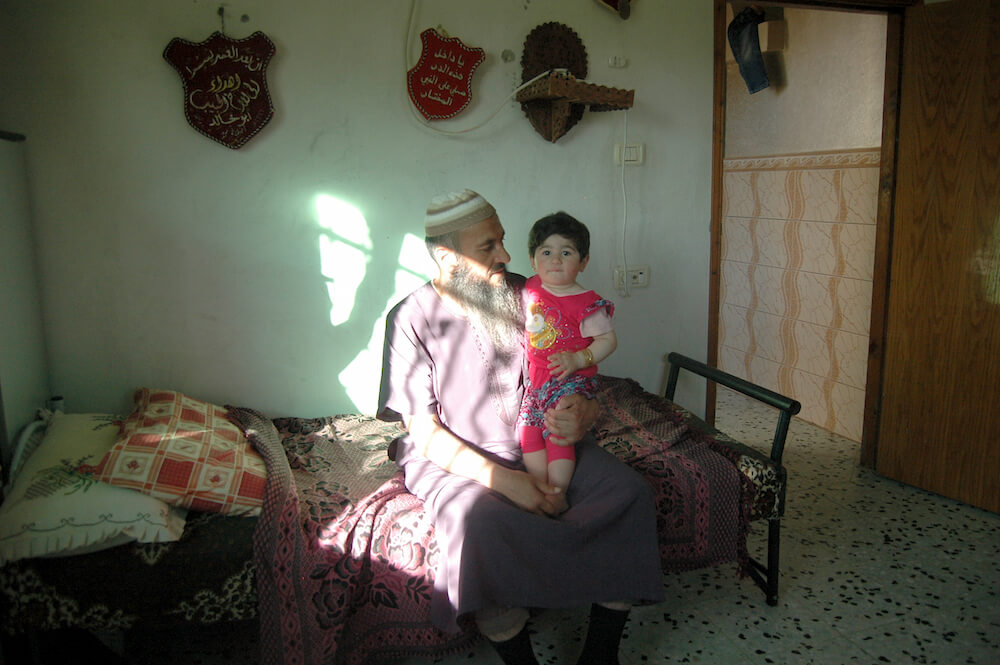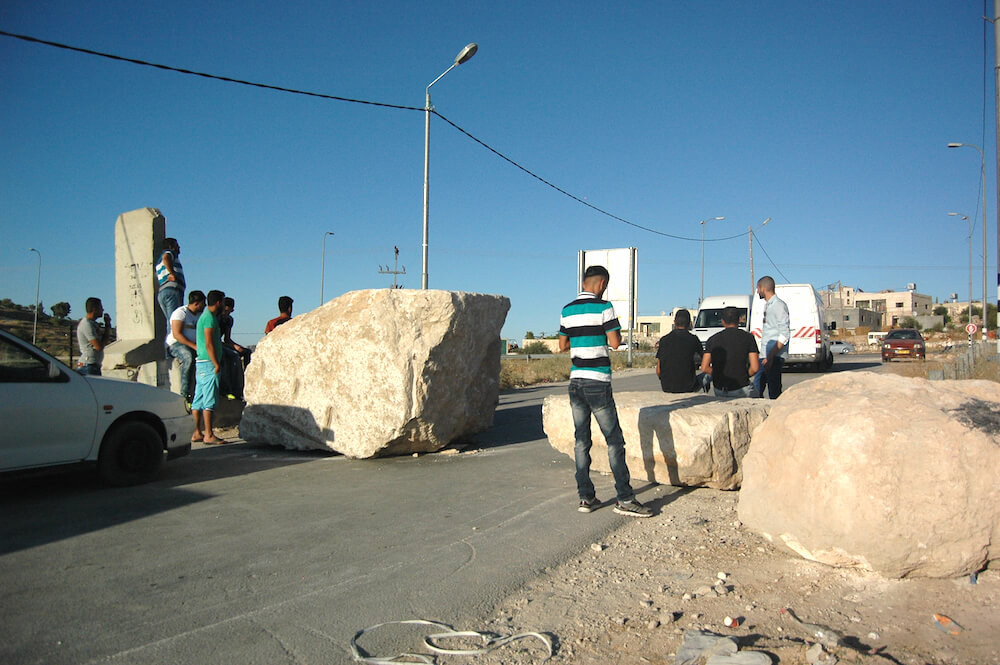When Mohammed Makhamri was shown a photograph of his son Khaled under arrested in Tel Aviv last Wednesday at an outdoor shopping center after an attack that killed four Israelis, he recognized him instantly even though the beard was gone.
In the picture Khaled looked uncharacteristically dapper. “He never wore a suit, so where did he get that from?” Mohammed said.
The clothes are just as much a mystery to the father, as the attack itself.
“I am very shocked. Like everyone else in this house, we are talking about a student —and excellent student,” said Mohammed. Khaled was enrolled in university in Jordan studying engineering on a prestigious governmental scholarship.
“He was supposed to travel to Jordan today. He was registered. He paid already,” Mohammed said.
In their hometown of Yatta in the southern West Bank, the fact that Palestinians are carrying out attacks on Israelis is discussed often. Mohammed explained the issue is in the news everyday, and debated around town mostly in the context of whether or not Israeli forces are justified when they kill attackers and alleged attackers. Khaled watched Al Jazeera Arabic and some local stations, but he was not the type of guy to be glued to the television.
Many Palestinians regard attacks on Israelis as an act of desperation and depression. It is widely understood that the individuals carrying out such incidents know the encounters will end in their deaths at the hands of Israeli police.
But Khaled was different, thought his father. The college student was well on his way to a rags to riches story, possessing a future full of opportunity, which makes the question of why all the more difficult for his family.
On the morning of the attack Khaled woke at 3 am with the rest of his family and said morning prayers for Ramadan. Then everyone had breakfast and took a nap. Before dozing, Khaled mentioned he wanted to go to Hebron with his cousin, Mohammed (nephew of Mohammed Makhamri)—the man identified by local media as the second shooter.
The plan was the two would take his computer to a repair store. Instead they crossed into Israel somewhere in the desert region where the border is porous and not heavily monitored.
By the afternoon “when Khaled was late and not back we started calling him,” said his father. Khaled’s phone was off, so was Mohammed’s.
A few hour’s later Khaled father was worried. “That’s when we called the Palestinian Authority police. Maybe they were arrested?” he wondered.
After nightfall leaving mosque for evening prayers, Mohammed was shown pictures of Khaled in Tel Aviv. News was breaking that one of the deadliest attacks in Tel Aviv in years had occurred.

In retrospect, Mohammed could see a shift brewing in Khaled. The pieces did not fall into place until it was too late. Khaled had taken a semester off of school, telling his family he needed “room to breathe.”
Mohammed is a lawyer, but disabled, and Khaled’s mother is a school teacher. Salaries are low in Yatta. As the oldest son, and one with a academic award to seek higher education abroad, it was expected that Khaled would contribute financially soon.
More than 60 of the attackers in the last 9 months came from Khaled’s district. And Yatta, in particular is a difficult place to live. It has the highest school drop out rate in the occupied Palestinian territory, settler attacks on agricultural land in the outskirts of town are common, and Israeli army ordered home demolitions in the surrounding areas are frequent.
“The reason why he did such a thing is the occupation, he is not working with any illegal organization,” his father maintained.
Hours after the attack Israeli forces entered Yatta. They measured the second story apartment where Khaled’s family lives. Everyone was collected into a salon and told to wait for 30 minutes while the Israeli forces searched the house.
The possibility that Khaled’s family would face home demolition was presumably not a surprise to him. When he was seven years old a relative living in the building next door killed an Israeli during the second Intifada. Afterwords the Israeli military razed the building leaving 28 people homeless, “most of them children” said Mohammed.
“They camped out in this room for two or three months,” Mohammed said. “They bought a small plot of land from some cars they sold, and then built a small house nearby.”
More often than not in Yatta, it is the municipality that pays for emergency houses for Palestinians whose homes are demolished.
“This year 42 houses were demolished,” in the areas surrounding Yatta said the town’s mayor Mousa Makhamri (of distant relation to Khaled and Mohammed). It was Mousa’s responsibility to organize temporary apartments for all of the displaced. He calculated his city spent $30,000 last year on short-term rentals.
This week, Mousa arranged for units for up to 10 families that could become homeless if Israel moves forward to demolish the buildings where Khaled and his cousin, and a third accomplice who turned himself into the Israeli authorities on suspicion of selling the assault weapons used in the attack.
Aside from hiring maintenance men to ensure the apartments are equipped with running water, Mousa is worried about impending supply shortages across Yatta.

Yatta was sealed six days ago with roadblocks and soldiers posted at the main entrance. The Israeli military barricaded the area hours after the Tel Aviv shootings. Since then Yatta’s residents have sprung into action to find alternatives routes around the siege. Palestinians come and go through back roads, leaving their cars next to cement blocks that close the streets and hitching rides in shared taxies cued up on the far side.
Others off-road through a dusty red dirt path in the town’s orchard fields.
“There is no need to close, to surround the village, to stop people from going to school because they got the two guys, and now the third guy,” Mousa said, adding, “It’s collective punishment for the whole village.”
One hundred years ago a few thousand inhabited Yatta. Today the population is more than 120,000. Mousa explained the growth has left Yatta densely populated with its services further taxed by some 25,000 Palestinians residing in satellite villages outside of the municipal borders. These herding communities send their children to school in Yatta, do all of their food shopping in Yatta, and when they are sick, Yatta has the closest medical clinics.
Mousa said these villagers who are not technically his constituents all depend on Yatta because of zoning. Yatta is the only town for miles that is inside of Area A of the West Bank and under the civil control of the Palestinian Authority. All of the hamlets in the vicinity are categorized as Area C, and therefore are fall the full control of the Israeli civil administration.
Building permits in Area C are notoriously hard to come by for everything from houses to education facilities. As a practical solution villagers often use the services of a neighboring town governed by the Palestinian Authority, and in this case Yatta.
“We can say this punishment is not only for Yatta, it is for all of the other area,” Mousa said.



Collective punishment is a war crime since the Nuremburg trials against the Nazis. Go figure.
“Instead they crossed into Israel somewhere in the desert region where the border is porous and not heavily monitored.”
You see, this simply cannot be true, because Zionist education clearly tells us that Israel’s “security barrier” reduced the attacks against Israel allready when 50% of it was finished:
https://electronicintifada.net/sites/default/files/styles/original_800w/public/2014-01/wasitjustthewall_final_hq_0.jpg?itok=QwjGo8ue×tamp=1448949295
War crimes being mentioned, I note that Israel, in the illustrious person of Mr. Danon, has just been elected by a substantial majority – 109 nations in support, I think – to chair one of the six major UN Committees. A big, bitter cherry is added to the cake by the fact that it is the International Law Committee. Something for us to suck upon.
Would Greece show the way?
Is it going to recognize a Palestinian State?
http://www.juancole.com/2016/06/greece-recognize-palestine.html
I’m surprised that these attacks do not happen more often. What’s the point of being the star student if, upon graduation, there will be no job, no hope, no reason to carry on. All it takes is one bad day for the stressed out beyond human limitations Palestinians to succumb to the temptation to carry out such a horrific act. After all, the Palestinians have to endure systemic, Israeli government sponsored and carried out genocide, again and again. Day. After. Day. For. More. Than. SixtyEight. Years.
When will this stop? What will it take for the global deciders to register their own complicit inhumanity in this epic tragedy? (rhetorical)